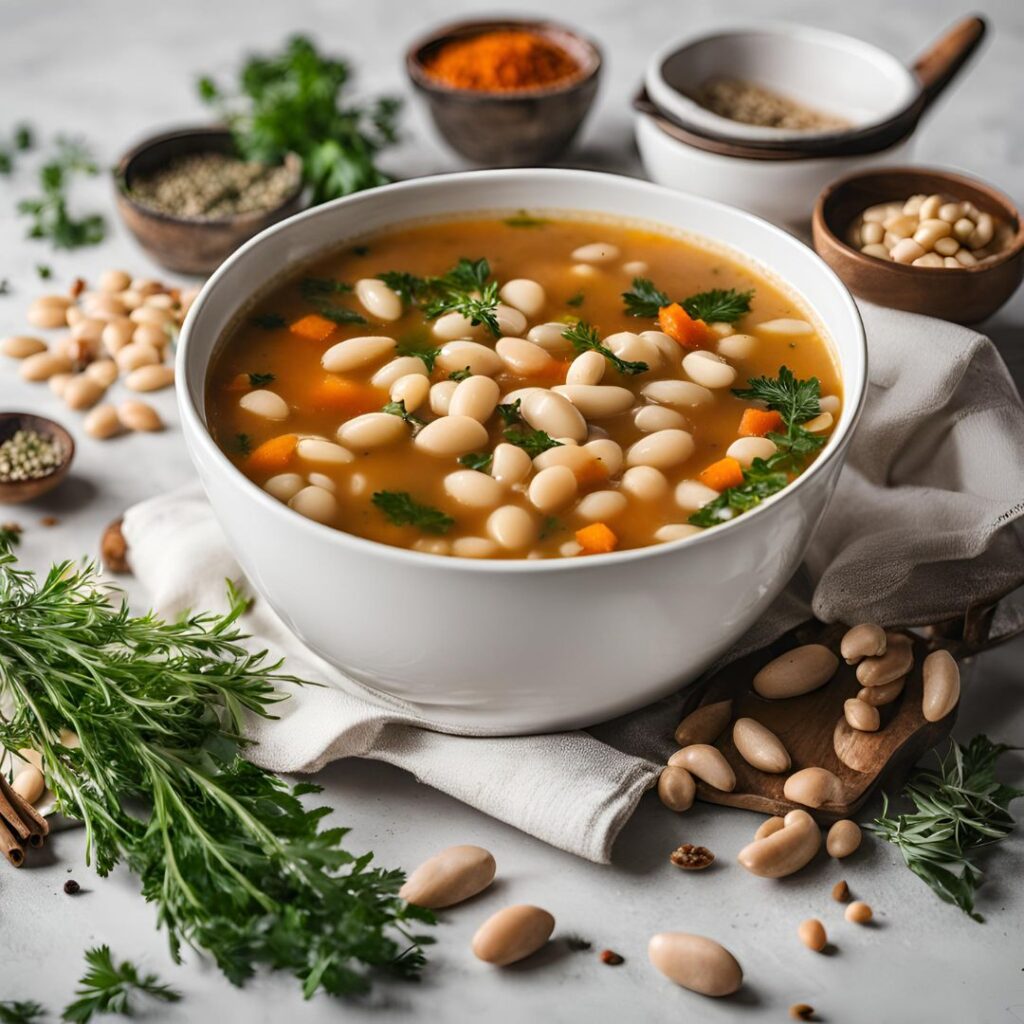

White Bean Soup Recipe : The Comforting Allure. In the world of culinary delights, few dishes evoke warmth and comfort quite like a bowl of soup. Among the myriad options available, white bean soup stands out as a classic favorite, cherished for its hearty texture, rich flavors, and nutritional benefits. This article will delve deep into the essence of white bean soup, exploring its history, ingredients, health benefits, and various recipes that can cater to different palates.
White bean soup has roots in various culinary traditions, particularly in Mediterranean and Italian cuisine. Beans, a staple ingredient in many cultures, have been enjoyed for thousands of years. Their versatility and nutritional value made them a go-to choice for meals, especially in regions where meat was scarce or expensive.
In Italy, for example, cannellini beans are celebrated for their creamy texture and slightly nutty flavor. They are often used in rustic soups and stews, embodying the heartiness of Italian home cooking. White bean soup has also found a place in French cuisine, where it is often prepared with aromatic herbs and spices, reflecting the French commitment to flavor and technique.
As food culture evolved, so did the preparation of white bean soup. While traditional recipes often called for simple ingredients and methods, modern interpretations have embraced creativity, allowing for endless variations that cater to personal tastes and dietary needs.
At the heart of any great soup lies its ingredients, and white bean soup is no exception. The primary ingredient, of course, is the white bean itself. Options like cannellini, navy, or Great Northern beans can be used, each offering a unique texture and flavor profile. Cannellini beans are particularly popular due to their creamy consistency, making them perfect for a smooth and hearty soup.
Aromatic Vegetables
The foundation of flavor in white bean soup often comes from a trio of aromatic vegetables: onions, carrots, and celery. This combination, often referred to as a mirepoix, provides a depth of flavor that enhances the overall taste of the dish. The sweetness of the onions, the earthiness of the carrots, and the subtle bitterness of the celery work harmoniously to create a rich flavor base.
Herbs and Spices
Herbs and spices play a crucial role in elevating the flavor of white bean soup. Garlic is a classic addition, imparting its robust aroma and taste. Dried herbs such as thyme, rosemary, and oregano add layers of complexity, while a bay leaf can infuse the soup with a subtle, fragrant note. The choice of herbs can vary depending on personal preference or regional traditions, making the soup adaptable to various tastes.
Greens and Additions
To further enhance the nutritional value and flavor of white bean soup, many recipes incorporate leafy greens such as kale or spinach. These greens not only add a pop of color but also contribute vitamins and minerals, making the soup even more wholesome. For those who enjoy a bit of heat, adding red pepper flakes or chili powder can provide a delightful kick, while a splash of lemon juice at the end brightens the overall flavor.
Optional Protein
While white bean soup can stand alone as a vegetarian dish, many variations include additional proteins. Chopped ham, bacon, or Italian sausage can introduce a savory element that pairs beautifully with the beans. For a plant-based option, consider adding tofu or tempeh for added texture and protein.
White beans are not only delicious but also incredibly nutritious. They are a fantastic source of plant-based protein, making them an excellent choice for vegetarians and vegans. A single cup of cooked white beans provides about 15 grams of protein, which is comparable to that found in meat.
In addition to protein, white beans are rich in dietary fiber. Fiber is essential for maintaining a healthy digestive system, promoting satiety, and regulating blood sugar levels. Incorporating fiber-rich foods like white beans into your diet can contribute to overall health and well-being.
Furthermore, white beans are packed with essential vitamins and minerals. They contain significant amounts of iron, magnesium, potassium, and folate, all of which are vital for various bodily functions, including energy production, muscle function, and red blood cell formation.
Making white bean soup is a straightforward process, yet it allows for a degree of artistry that can transform simple ingredients into a comforting meal. The method typically involves sautéing the aromatic vegetables until they are tender, adding the beans and broth, and then simmering to develop the flavors.
Preparing Dried Beans vs. Canned Beans
For those who prefer using dried beans, the process begins with soaking the beans overnight. This step not only reduces cooking time but also improves digestibility. After soaking, the beans are drained and simmered until tender, which can take anywhere from 1 to 1.5 hours.
Alternatively, canned beans provide a convenient option for a quicker meal. Simply rinse and drain the beans before adding them to the soup during the last stages of cooking. This method significantly reduces preparation time, making it ideal for busy weeknights.
Blending for Creaminess
One of the most delightful aspects of white bean soup is its versatility in texture. For a creamier consistency, consider blending a portion of the soup using an immersion blender or a traditional blender. This step creates a velvety base while retaining some whole beans for texture, resulting in a satisfying and hearty dish.
White bean soup is a dish that can be enjoyed in various settings, from casual family dinners to elegant gatherings. It pairs beautifully with crusty bread or garlic toast, allowing you to soak up every last drop of the delicious broth. A simple green salad with a light vinaigrette can complement the richness of the soup, balancing the meal.
For those who enjoy garnishing their dishes, consider topping the soup with freshly chopped herbs, a sprinkle of Parmesan cheese, or a drizzle of olive oil for added flavor. A squeeze of lemon juice just before serving can also brighten the dish, enhancing its overall taste.
There’s something profoundly rewarding about making soup from scratch. The process of chopping vegetables, simmering the ingredients, and watching the flavors meld together creates a sense of connection to the food. White bean soup, in particular, embodies the spirit of home cooking — it’s nourishing, satisfying, and simple to prepare.
Whether you’re cooking for yourself, your family, or friends, a pot of white bean soup is sure to bring smiles and warmth to the table. It’s a dish that can be adapted to fit any occasion or dietary preference, making it a staple in any kitchen.
---
White bean soup is more than just a dish; it’s a celebration of flavor, nutrition, and comfort. With its rich history, simple yet delicious ingredients, and countless variations, it has earned its place as a beloved classic in homes around the world. So, the next time you crave a nourishing bowl of soup, consider whipping up a batch of white bean soup. With each spoonful, you’ll enjoy the warmth and satisfaction that comes from a meal made with love and care.
Number of Servings : 6-8 persons
If you’re using dried beans, soaking them overnight is essential. This process not only reduces cooking time but also helps to soften the beans and improve digestibility. Simply place the beans in a bowl, cover them with plenty of water, and let them soak for 8 hours or overnight. Drain and rinse the beans before using them in your soup.
Start by sautéing the aromatic vegetables (onions, carrots, and celery) in olive oil until they are softened and fragrant. This step adds depth of flavor to the soup. Consider adding garlic and herbs (like thyme and rosemary) toward the end of the sauté to prevent burning and to enhance their flavors before adding the broth.
The broth you choose can significantly impact the taste of your soup. Opt for a high-quality vegetable or chicken broth for the best flavor. If you're using store-bought broth, taste it first and adjust the seasoning in your soup accordingly. Homemade broth is an excellent option if you have the time, as it allows you to control the ingredients and flavors.
For a creamier texture, reserve a portion of the soup (about 1-2 cups) once the beans are tender and blend it using an immersion blender or a standard blender. This creates a velvety base while still keeping some whole beans for texture. You can also add a splash of cream or a drizzle of olive oil for extra richness if desired.
Beans absorb flavors during cooking, so it's important to taste and adjust the seasoning toward the end of the cooking process. Add salt, pepper, and any acidic elements like lemon juice or vinegar just before serving. This will brighten the flavors and ensure the soup isn’t over-salted during cooking. Adding fresh herbs as a garnish just before serving can also enhance the overall flavor and presentation.
You can use various types of white beans, but the most popular choices are cannellini beans, navy beans, and Great Northern beans. Cannellini beans are especially favored for their creamy texture, making them ideal for soups.
Yes, you can use canned beans for convenience in this recipe of White Bean Soup. If you choose to do so, simply drain and rinse them before adding them to the soup during the last 10-15 minutes of cooking. This helps to heat them through without overcooking.
To make your white bean soup vegetarian or vegan, simply use vegetable broth instead of chicken broth and omit any meat (such as ham or bacon) from the recipe. You can add more vegetables or plant-based proteins, like tofu, for added flavor and nutrition.
You can enhance the flavor of white bean soup by adding ingredients like fresh herbs (such as parsley, thyme, or rosemary), spices (like red pepper flakes or smoked paprika), and a splash of lemon juice for brightness. Sautéing aromatics like garlic, onions, carrots, and celery will also create a rich flavor base.
Leftover white bean soup can be stored in an airtight container in the refrigerator for up to 3-5 days. You can also freeze the soup for up to 3 months. When reheating, add a little water or broth to thin it out, as the soup may thicken upon cooling.
Absolutely! To make white bean soup in a slow cooker, sauté the aromatics on the stovetop first, then combine all ingredients in the slow cooker and cook on low for 6-8 hours or high for 3-4 hours. For the Instant Pot, sauté the vegetables using the sauté function, then add the remaining ingredients and cook on high pressure for about 30 minutes. Ensure you allow for natural pressure release.
If you prefer a thicker soup, you can blend a portion of the soup (about 1-2 cups) using an immersion blender or standard blender, then stir it back into the pot. Alternatively, you can mash some of the beans with a fork or potato masher to create a creamier texture.
White bean soup pairs well with a variety of sides. Some popular options include crusty bread (like sourdough or baguette), a fresh green salad, or garlic toast. You could also serve it with a simple cheese plate or roasted vegetables for a more substantial meal.
White bean soup is more than just a dish; it’s a celebration of flavor, nutrition, and comfort. With its rich history, simple yet delicious ingredients, and countless variations, it has earned its place as a beloved classic in homes around the world. So, the next time you crave a nourishing bowl of soup, consider whipping up a batch of white bean soup. With each spoonful, you’ll enjoy the warmth and satisfaction that comes from a meal made with love and care
Enjoy the yum :)